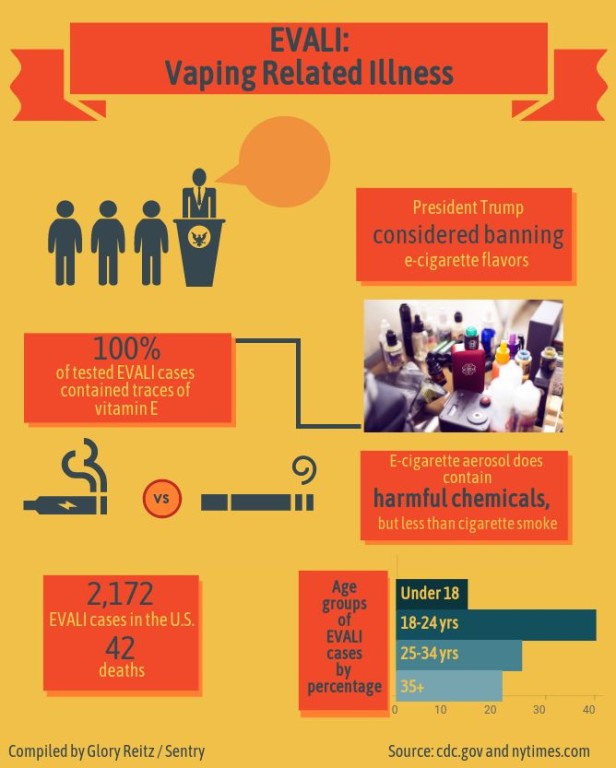Glory Reitz
Reporter
The United States Centers for Disease Control and Prevention (CDC) has confirmed 2,290 cases of e-cigarette, or vaping, product use associated lung injuries (EVALI) and 47 deaths as of press time. The presence of tetrahydrocannabinol (THC) and vitamin E acetate in many cases is being investigated.
The CDC has released research on 29 EVALI patients, two of whom have now died. Traces of THC were found in 80% of fluid samples collected from the lungs, and vitamin E acetate was present in every sample. The CDC also reported that about 86% of EVALI patients reported using THC-containing products, which has led to investigation into THC.
According to Sandra Wilson, director of Crowder’s nursing department, THC is the psychoactive portion of marijuana. It acts as a negative neuromodulator, capable of relaxing pain, seizure activity and glaucoma. Despite the potential positive medical uses, little is known about THC’s side-effects, especially when used recreationally and through informal sources.
“There’s a lot of confusion around THC,” said Wilson. “Since it’s federally illegal, it is difficult to do a research project on it.”
The New York Times described vitamin E acetate as a sticky chemical substance that makers of illicit vaping fluids sometimes add as a thickener or to dilute THC in vape products and increase their profits. While human skin and digestive systems can process vitamin E acetate, lungs are not set up for it, and can be badly damaged by exposure.
A CDC study conducted in Illinois found that, compared to healthy vapers, EVALI patients were more likely to vape THC several times a day, nine times as likely to buy THC from informal sources like dealers, friends or on the street. EVALI patients were also eight times as likely to have used Dank Vapes, a “class of largely counterfeit THC-containing products.”
Vaping has been commonly marketed as a method to quit cigarette smoking, an addiction which, according to the National Cancer Institute, causes 480,000 premature deaths each year.
Wilson argued that vaping is a poor alternative to smoking. “The research is just now hitting,” she said, “but we’re seeing many of the same side effects in vaping [as in cigarettes].”
Lung damage from smoking, according to Wilson, can last any amount of time from a week to a lifetime after quitting. She said that while research does not yet show how similar vaping lung damage is to that of smoking, it does show vaping can harm the lungs.
The CDC maintains its recommendation that people should not buy any type of vaping products, particularly those containing THC from informal sources, but they have also added a recommendation not to modify or add any substances such as vitamin E acetate to vaping products.





Leave a Reply